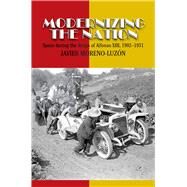Modernizing the Nation Spain during the Reign of Alfonso XIII, 1902-1931
, by Moreno-Luzon, Javier- ISBN: 9781845195052 | 1845195051
- Cover: Hardcover
- Copyright: 9/19/2012
This book is a new short history of Spain during a crucial period, the reign of Alfonso XIII (1902-1931). Traditionally, this has been seen as a time that epitomised the worst features of 'old Spain': a backward country, poor and chronically unequal, with a government dominated by a tiny oligarchy ruling over a corrupt system -- an anomaly in Western Europe. However, this study, in line with the most recent historiography, offers a new insight into the period as one that was actually characterised by extensive modernisation in Spanish society and politics. Spain experienced, albeit in an unbalanced way, many of the changes already in progress in other European countries, such as urbanisation, industrialisation, mass migration, the rise in literacy, secularisation, and the emergence of mass politics. It then suffered profound conflicts associated with these changes, and a political dynamic of reform and reaction, revolution and counter-revolution. The book is divided into four main sections, dealing, chronologically, with the beginnings of the regenerationist era, the climax of the liberal monarchy, conflicts during the crisis of liberalism, and the military dictatorship of Primo de Rivera. Primarily a political history, it also touches on social, cultural and economic issues, and offers a comparative European perspective. Last but not least, there is a special interest in the problems of nation-building, a central theme of the period, and the competition between different versions of Spanish nationalism and regional nationalist movements -- above all, Catalanism and Basque nationalism. Overall, the Spanish situation is presented here not as a unique case but as a variation within the difficulties that were encountered all across continental Europe in achieving the transition from classical liberalism to mass democracy.






